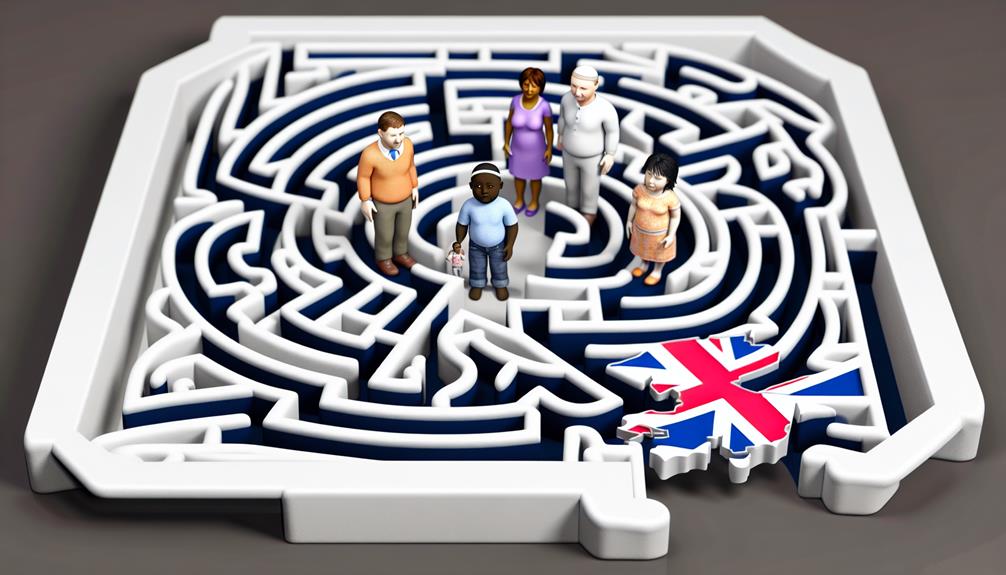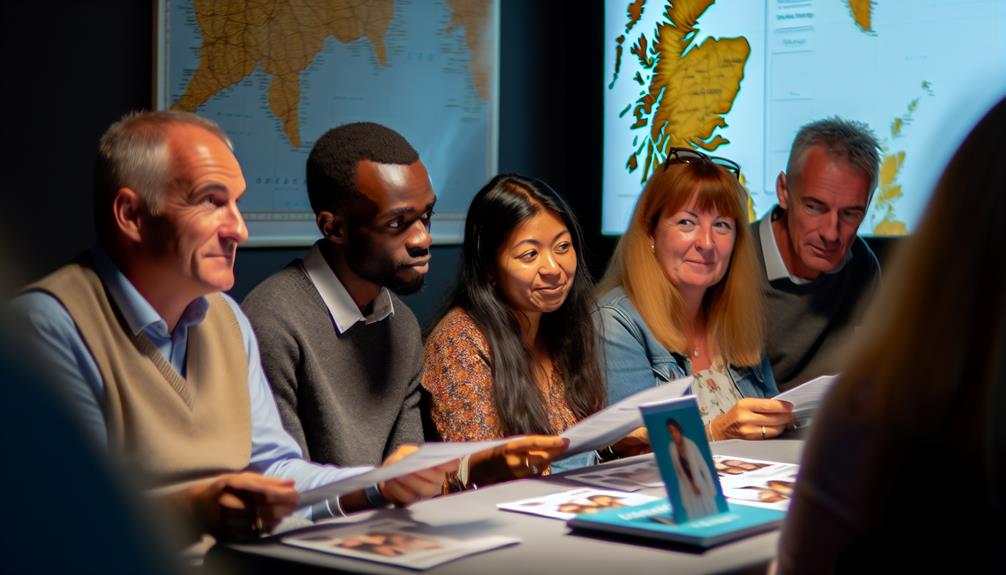Starting your UK foster care adoption journey? Here's a snapshot. Confirm your eligibility: you must be over 21 with no specific criminal convictions. Initiate contact with an adoption agency or local authority for an information session. Proceed to home study and assessment, ensuring your readiness for fostering. Then comes the connection: your needs harmonize with a child's best interests. After introductions, you'll move into a trial living arrangement before final legal confirmation occurs. Post-adoption, utilize support services for a smoother journey. There are nuances and enlightening aspects to explore further for every stage, on this rewarding path.
Key Takeaways
- Understand the eligibility criteria for adoption in the UK, including personal, financial, and legal requirements.
- Participate in initial enquiry and information sessions to gain a comprehensive understanding of the foster care adoption process.
- Undergo a home study and assessment process to establish your readiness and suitability for adopting a child from foster care.
- Engage in the matching process, considering the child's needs, experiences and cultural background to ensure a successful adoption.
- Utilize post-adoption support services for emotional support and guidance, and to connect with other adoptive parents for shared experiences and advice.
Understanding the UK Foster System

To navigate the UK foster care adoption process effectively, it's vital to first understand the intricacies of the UK foster system. The Foster System Evolution in the UK has been shaped by a series of Child Welfare Policies, each aiming to improve the lives of the children involved. These policies have created a system that prioritises the child's best interests, ensuring they're placed in a safe, nurturing environment.
It's important to note that the UK foster system isn't static. It's continually evolving to meet the changing needs of children and their potential foster families. A solid grasp of the current system's structure and function will enable you to anticipate potential challenges in the adoption process and equip you with the knowledge to overcome them.
Remember, the UK foster system isn't a one-size-fits-all solution. It's a flexible framework designed to accommodate the unique circumstances of each child and prospective adoptive parent. Understanding the system is the first step towards fulfilling your desire to provide a loving home for a child in need.
Embrace the learning process, because your efforts today will shape your adoption journey tomorrow.
Eligibility Criteria for Adoption
As you begin your quest to adopt from the UK foster care system, it's vital you grasp the eligibility criteria. The process involves evaluating your personal suitability and meeting specific legal adoption requirements.
We're here to assist you in navigating these requirements, ensuring you're ready and informed every step of the way.
Assessing Personal Suitability
Before delving into the UK foster care adoption process, it's essential that you assess your personal suitability by understanding the eligibility criteria. Among these, financial considerations and emotional readiness are crucial.
Adopting a child isn't merely a financial undertaking; it requires a long-term commitment and significant emotional investment. You need to be financially stable not just to meet immediate costs, but also to provide for the child's future needs.
Emotional readiness is equally crucial. You should be prepared to handle the joys and challenges that come with parenting, including dealing with a child's potential emotional and behavioural issues.
Legal Adoption Requirements
While evaluating your personal readiness is critical, you must also meet the legal adoption requirements set by UK law to become an eligible adopter. The adoption legislation stipulates you must be at least 21 years old, with no upper age limit, but your health and personal circumstances will be assessed.
You may adopt individually or jointly with a partner, regardless of marital status or sexual orientation. You don't need to own a home, but you must have stable living conditions. A criminal record doesn't automatically disqualify you; however, certain offences against children bar you from adopting.
International adoption has additional requirements, including dealing with the adoption laws of the child's country. Always consult with an adoption professional to fully understand your eligibility.
Initial Enquiry and Information Session

Diving into the world of UK foster care adoption, your first step will typically be an initial enquiry and attending an information session. This is your opportunity to clear any adoption myths you might've heard and gather all the information you need. Reach out to your local authority or an adoption agency, who can guide you through the process. It's important to approach this with an open mind and prepared questions.
These sessions are meant to provide you with an overview of the adoption process and the children who need adoptive families. They'll dispel common adoption myths, such as the belief that single or older people can't adopt. In fact, the focus is on your ability to provide a stable, loving home.
Financial considerations are also discussed during these sessions. Many prospective adopters worry about the cost, but adoption from foster care is generally less expensive than other routes. In some cases, financial support may be available. Remember, this is the first step, and there's no commitment yet. Take your time, absorb the information, and reflect on whether adoption is the right path for you.
Home Study and Assessment Process
Now, let's turn your attention to the home study and assessment process. This is a pivotal stage where you'll get to demonstrate your readiness and suitability to adopt.
We'll guide you through the ins and outs, ensuring you understand how to best navigate this important part of your adoption journey.
Understanding Home Study
Starting the process of a home study might feel overwhelming, but it's an essential step in the UK foster care adoption process, designed to make sure you're well-prepared for the rewarding challenges ahead. Your Home Study Preparation involves an in-depth look into your life, evaluating your readiness to foster.
- Personal Interviews: Expect to discuss your upbringing, relationships, and parenting beliefs.
- Home Inspection: Your living conditions will be assessed for safety and suitability.
- References: Personal and professional references will help evaluate your character.
- Background Checks: Criminal checks guarantee child safety.
Assessment Process Explained
In the heart of the home study lies the assessment process, a thorough examination designed to make sure you're fully equipped for foster care adoption. This involves a detailed look at your lifestyle, home environment, and your understanding of the financial implications involved in adoption. It's important to be prepared to discuss your financial stability and plans for managing the additional costs of raising a child.
Cultural considerations also play an important role in the assessment. You'll need to demonstrate an openness to supporting the child's cultural heritage, including their ethnicity, language, and religion. Remember, the goal here is to guarantee the child's wellbeing and to promote a sense of belonging in their new family. Your willingness and ability to meet these needs are crucial in the assessment process.
Matching Process With a Child

Once you've completed the necessary training and paperwork, you'll move on to the crucial step in the adoption journey: the matching process with a child. This stage requires a delicate balance of several elements to guarantee the best possible outcome for all involved.
Remember, the match isn't just about your needs and wants as an adoptive parent. The child's perspective is equally important. They need to feel safe, loved, and understood. Cultural considerations also play a significant role, especially when adopting children from diverse backgrounds.
Here's a list of steps to follow during the matching process:
- Review the Child's Profile: You'll receive detailed information about the child, including their personality, interests, and any special needs.
- Meet with Social Workers: They'll help you understand the child's experiences, cultural background, and emotional needs.
- Reflect on the Match: Consider the information presented and decide whether you feel equipped to meet the child's needs.
- Express Interest: If you believe you're a good match, express your interest to the social worker. They'll help guide you through the next steps.
This process is both challenging and rewarding, but with patience and perseverance, you'll find the right match.
Introductions and Transition Period
After discovering your match, you'll start on an important phase known as the initiation and shift period, designed to help both you and the child adjust to this new chapter. Building Trust Strategies will be key during this time as you slowly establish a relationship with the child. This might involve actions as simple as spending quality time together, listening to their fears, or providing consistent care.
Emotional Preparedness is equally essential during this change. Realize that the child might've experienced trauma, and might initially react with fear or suspicion. Your role is to provide a safe, reassuring environment that promotes healing and trust-building.
Remember, you're not alone in this journey. Social workers and therapists will provide guidance and support throughout this period. They can offer advice, help manage expectations, and give you practical strategies for dealing with any emotional or behavioral issues that may arise.
Patience, empathy, and understanding are central to maneuvering through this change period successfully. It might take time, but remember, every step you take brings you closer to creating a caring, stable home for your child. In this process, you're not just adopting a child; you're building a family.
Legal Process of Adoption in UK

Ready to navigate the legal process of adoption in the UK? It's a journey that's both rewarding and intricate. Let's break down this process into four manageable steps:
- Assessment: You'll go through a thorough assessment process to determine your suitability as adoptive parents. This involves background checks, home visits, and interviews.
- Matching: Once approved, you'll be paired with a child whose needs you can meet. This is an emotional phase, requiring patience and determination.
- Adoption Order Application: After a successful match and placement, you'll apply to the court for an adoption order. This legalizes your relationship with the child and transfers parental rights to you.
- Adoption Costs: Fortunately, adoption from foster care in the UK is generally free. However, legal costs can arise and you'll need to budget for these.
If you're considering international adoptions, remember that costs and legal requirements can vary significantly. It's important to research thoroughly and seek expert advice.
Post-Adoption Support Services
Getting through the adoption process doesn't end once the court finalizes your adoption; it's equally important to familiarize yourself with the available post-adoption support services in the UK. These services are critical in helping you and your adopted child adjust to the new family dynamics, and they provide a plethora of resources to guarantee a smooth adjustment.
One available resource is support groups, which offer a unique platform to connect with other adoptive parents. The benefits of support groups can't be overstated. They offer an invaluable source of understanding, shared experiences, and practical advice. You'll find that you're not alone in your journey, and you can learn from the experiences of others who've walked a similar path.
Another important service is therapeutic interventions. These services provide professional assistance to help your child overcome any emotional or psychological issues related to adoption. Therapists trained in adoption-related issues can guide you through strategies to address your child's specific needs.
Challenges and Overcoming Them

Traversing the adoption journey isn't without its challenges, but understanding these obstacles and how to overcome them can make all the difference. Let's unpack some of the challenges you might face and how to tackle them.
- Developing Emotional Resilience: The adoption process can be emotionally taxing. However, developing your emotional resilience is vital. This means maintaining a positive attitude, managing your emotions well and bouncing back from setbacks.
- Dealing with Bureaucracy: The legalities and paperwork can be overwhelming. Stay organised, ask for clarifications when needed and take one step at a time.
- Managing Expectations: It's natural to have expectations, but being flexible helps. Understand that it's a process and each child is unique.
- Building Support Networks: Connect with others on the same journey. Join adoption support groups, forums, or communities. Their experiences, advice, and encouragement can be invaluable.
Frequently Asked Questions
What Are the Tax Implications for Adopting a Child in the Uk?"
In the UK, you're not eligible for Adoption Tax Credits. However, you may see changes in your Child Benefit. It's important you're aware of these financial implications before adopting a child.
How Will Adopting a Child Impact My Employment Situation?"
Adopting a child can affect your work life balance. However, UK Employment Rights provide adoption leave. You'll need to communicate with your employer, ensuring they're supportive during this transformative period in your life.
What Is the Process for Adopting a Child From Another Country Into the Uk?"
To adopt a child from another country, you'll need to meet Adoption Eligibility criteria and fulfill Documentation Necessities. It's a complex process, involving approval, matching, and finalization phases. Be prepared for a lengthy journey.
How Can I Prepare My Existing Children for the Adoption of a New Sibling?"
You'll want to employ sibling bonding strategies and adoption adjustment tips. It's not just about preparing your home, it's about preparing their hearts. Start conversations early, involve them in the process, and foster empathy and understanding.
Does the UK Provide Any Financial Assistance or Grants for Adoption?"
Yes, the UK does provide financial support for adoptive parents. You're eligible for Adoption Grants and other benefits, which can greatly help in easing the financial burden associated with the adoption process.
Conclusion
Exploring the UK foster care adoption process may seem challenging, but remember, each step you take is a footprint in a child's life. It's a journey filled with hope, patience, and resilience.
Every obstacle, every paperwork, every waiting period, is all part of your story to create a loving home. And remember, you're not alone – support and guidance are always at your disposal.
It's a demanding voyage, but the destination – a family – is worth every step.




